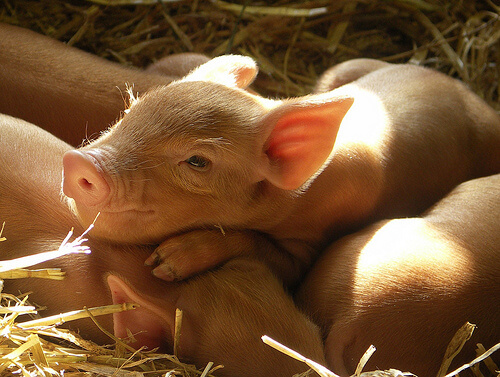One of my favorite new blogs is called Worms and Germs.
They recently wrote an interesting article about pig ear treats. One thing I had not considered, which they wrote about, is the cross-contamination of Salmonella in the bulk bins at pet food stores:
Salmonella in pig ear treats
An Irish study has reported a high rate of Salmonella contamination in pig ear treats. Various earlier studies have identified Salmonella in pig ear treats, and human infections have been associated with contact with such treats. Recommendations for processing and handling of pig ear treats have been made and have hopefully reduced the likelihood of contamination, but there’s no information about adherence to these recommendations.
In the most recent study, published in Food Research International (Adley et al. 2011), researchers purchased 102 pig ears from 4 pet shops in Limerick City, Ireland. Salmonella was detected in 28% of samples. A variety of different Salmonella types were found, including antibiotic resistant strains and types that are common causes of disease in people.
Interestingly, all of the contaminated treats were from 2 of the 4 stores. The two negative stores only sold treats sourced from within the European Union, and one of them only sold pre-packaged treats. The other two stores sold treats sourced from the EU and Brazil, and sold some in bulk bins. All positive treats were from the same distributor, and all were from bulk bins.
The high prevalence of Salmonella in these treats is concerning, particularly in light of standard guidelines for processing such treats and EU regulation that if treats are not Salmonella-free, they must have less than 1 Salmonella bacterium per 25 g of product.
Contamination of bulk bin treats isn’t surprising, as I mentioned in a post just the other day. Bulk bins allow for cross contamination, and a single positive treat (or a single contaminated hand going into the bin) can result in contamination of many other treats. Also, picking treats out of a bulk bin can potentially contaminate consumers’ hands, and there’s an additional concern that bulk bins are often kept at a level where young children (a high risk group) can access them.
Contact with Salmonella in pig ear treats is a risk, and people should wash their hands after any contact with a pet treat. Avoiding bulk bin treats is a good idea. Purchasing irradiated and individually packaged treats should also help reduce the risk. Unfortunately, stores do a lousy job of notifying people about the risk. As the paper states “We recommend public awareness advertising in pet shops to alert pet owners of the risks associated with pig ear pet treats and hygiene practices that should be followed.”
Source: Worms and Germs Blog Published by University of Guelph Centre for Public Health & Zoonoses, Ontario Veterinary College, Posted on February 3, 2011 by Scott Weese


